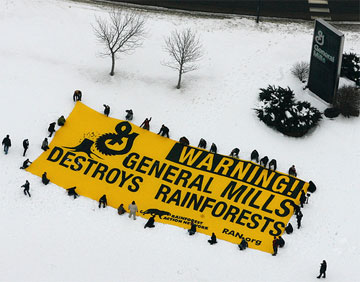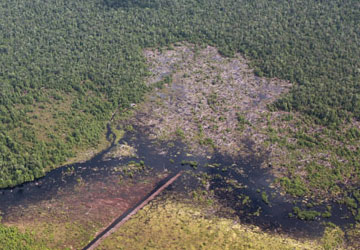An activist group linked General Mills to destruction of rainforests in Southeast Asia in dramatic fashion on Tuesday, when it unfurled a giant banner, reading “Warning: General Mills Destroys Rainforests”, outside the company’s Minneapolis headquarters building.
The stunt was executed by the Rainforest Action Network (RAN), an activist group campaigning to highlight the role that palm oil consumption has in deforestation in Indonesia, Malaysia and Papua New Guinea. Expansion of oil palm plantations over the past twenty years has emerged as one of the biggest threats to the Southeast Asia’s rainforests, which house such endangered species as the orangutan, the pygmy elephant of Borneo, and the Sumatran rhino. Palm oil production has also become a significant source of greenhouse gas emissions, which result from deforestation, degradation and conversion of peatlands, and fires set for plantation establishment.
 Photo: Mercury Miller / RAN  Photo taken in Central Kalimantan (Indonesian Borneo) in May 2009 by Rhett Butler. Wetlands International, an NGO, estimates that production of one metric ton of palm oil will result in an average emission of 20 tons of carbon dioxide from peat decomposition alone, not including emissions resulting from production or combustion. |
RAN says that at least a hundred General Mills products, including goods sold under Pillsbury, Betty Crocker, Stovetop Hamburger Helper and Toaster Strudel brands, contain palm oil or palm oil derivatives. RAN is calling for General Mills to commit to buying only responsibly-sourced palm oil.
“General Mills could do a lot to transform the palm oil supply in the food industry and to protect rainforests, communities and the climate,” said Madeline Gardner, Minneapolis-based activist, in a statement. “As an industry leader and a trusted brand, General Mills could have a huge impact in changing the food industry for good.”
Unilever, the world’s largest corporate buyer of palm oil, has already committed to using only palm oil produced in a socially and environmentally responsible manner. Last month the company severed ties with Sinar Mas after an investigation showed that the palm oil producer was clearing rainforests and draining peatlands.
In its campaign, dubbed The Problem with Palm Oil, RAN argues that General Mills and other companies face a risk of consumer backlash if they continues current sourcing policies.
“Palm oil is a leading cause of rainforest destruction in places like Indonesia,” said Ashley Schaeffer of Rainforest Action Network. “As long as General Mills is using irresponsibly sourced palm oil, their customers will have to worry that they are contributing money to rainforest destruction.”
Related articles
Consumers should help pay the bill for ‘greener’ palm oil

(01/12/2010) Palm oil is one of the world’s most traded and versatile agricultural commodities. It can be used as edible vegetable oil, industrial lubricant, raw material in cosmetic and skincare products and feedstock for biofuel production. Growing global demand for palm oil and the ensuing cropland expansion has been blamed for a wide range of environmental ills, including tropical deforestation, peatland degradation, biodiversity loss and CO2 emissions. In response to these concerns, a group of stakeholders—including activists, investors, producers and retailers—formed the Roundtable on Sustainable Palm Oil (RSPO) to develop a certification scheme for palm oil produced through environmentally- and socially-responsible ways. It is widely anticipated that the creation of a premium market for RSPO-certified sustainable palm oil (CSPO) would incentivize palm oil producers to improve their management practices.
Unilever suspends palm oil contract after supplier found to be destroying rainforests

(12/12/2009) The world’s largest user of palm oil, Unilever, has suspended its $32.6 million contract with the Indonesian group Sinar Mas after an independent audit proved that Sinar Mas is involved in the destruction of rainforest, reports Reuters. The audit was conducted early this year after a report by Greenpeace alleged that Sinar Mas was engaged in deforestation and the draining of peatlands, both of which release significant amounts of greenhouse gases into the atmosphere. Deforestation across Indonesia and Malaysia, in part for oil palm plantations, has also added pressure on many many endangered species, including orangutans, tigers, elephants, and rhinos.
Oil palm workers still below poverty line, despite Minister’s statements
(11/19/2009) On October 19th, Plantation Industries and Commodities Minister Tan Sri Bernard Dompok told parliament that oil palm harvesters and rubber tappers are living above Malaysia’s national poverty line, according to a story in the Malaysian Insider. But now representatives of the workers are saying Dompok lied.
Palm oil developers in Papua New Guinea accused of deception in dealing with communities

(09/25/2009) Papua New Guinea, the independent eastern half of the world’s second largest island (New Guinea), houses one of the planet’s last frontier forests. These forests support a wealth of plants and animals as well as the Earth’s most diverse assemblage of cultures—some 830 languages are spoken in Papua New Guinea (PNG), representing more than 12 percent of the world’s 6,900. But PNG’s forests are fast-changing. Between 1972 and 2002 PNG lost more than 5 million hectares of forest, trailing only Brazil and Indonesia among tropical countries. Forest loss has been primarily a consequence of industrial logging and subsistence agriculture, but large-scale agroindustry—especially development of oil palm plantations—has emerged as an important new driver of land use change. Dozens of international companies have set up operations in the country over the past decade, including Cargill, an agribusiness giant based in Minneapolis. While Cargill says it is committed to sustainable and responsible palm oil production across its three plantations in PNG, the firm has been targeted by local and international NGOs, which claim it has polluted rivers and deceived local communities into signing agreements they do not understand. Some landowners say they are receiving few of the benefits oil palm promised to deliver, while losing their independence—they are now reliant on an export-oriented crop they can’t eat. Opposition to further oil palm expansion is now growing, especially in Oro Provice, where Cargill’s plantations are based.
Britain bans palm oil ad campaign
(09/09/2009) Britain’s Advertising Standards Authority (ASA), a group that regulates advertisements, has again banned “misleading” ads by the palm oil industry, reports the Guardian. ASA ruled that a campaign run by the Malaysian Palm Oil Council (MPOC) makes dubious claims, including that palm oil is the “only product able to sustainably and efficiently meet a larger portion of the world’s increasing demand for oil crop-based consumer goods, foodstuffs and biofuels.” The ad said criticism over “rampant deforestation and unsound environmental practices” were part of “protectionist agendas” not based on scientific fact. ASA held the ad breached several of its advertising standards codes, including “substantiation,” “truthfulness,” and “environmental claims.” In rebuking the MPOC, the ASA said that the merits of new eco-certification scheme promoted by the palm oil industry is “still the subject of debate” and that the ad’s attacks on detractors implied that all criticisms of the palm oil industry “were without a valid or scientific basis.”
Rehabilitation not enough to solve orangutan crisis in Indonesia

(08/20/2009) A baby orangutan ambles across the grass at the Borneo Orangutan Survival Foundation’s Nyaru Menteng rehabilitation center in Central Kalimantan, in the heart of Indonesian Borneo. The ape pauses, picks up a stick and makes his way over to a plastic log, lined with small holes. Breaking the stick in two, he pokes one end into a hole in an effort to extract honey that has been deposited by a conservation worker. His expression shows the tool’s use has been fruitful. But he is not alone. To his right another orangutan has turned half a coconut shell into a helmet, two others wrestle on the lawn, and another youngster scales a papaya tree. There are dozens of orangutans, all of which are about the same age. Just outside the compound, dozens of younger orangutans are getting climbing lessons from the Borneo Orangutan Survival Foundation (BOS) staff, while still younger orangutans are being fed milk from bottles in a nearby nursery. Still more orangutans—teenagers and adults—can be found on “Orangutan Island” beyond the center’s main grounds. Meanwhile several recently wild orangutans sit in cages. This is a waiting game. BOS hopes to eventually release all of these orangutans back into their natural habitat—the majestic rainforests and swampy peatlands of Central Kalimantan, on the island of Borneo. But for many, this is a fate that may never be realized.
Why is palm oil replacing tropical rainforests?
(04/25/2006) In a word, economics, though deeper analysis of a proposal in Indonesia suggests that oil palm development might be a cover for something more lucrative: logging. Recently much has been made about the conversion of Asia’s biodiverse rainforests for oil-palm cultivation. Environmental organizations have warned that by eating foods that use palm oil as an ingredient, Western consumers are directly fueling the destruction of orangutan habitat and sensitive ecosystems. So, why is it that oil-palm plantations now cover millions of hectares across Malaysia, Indonesia, and Thailand? Why has oil palm become the world’s number one fruit crop, trouncing its nearest competitor, the humble banana? The answer lies in the crop’s unparalleled productivity. Simply put, oil palm is the most productive oil seed in the world. A single hectare of oil palm may yield 5,000 kilograms of crude oil, or nearly 6,000 liters of crude.